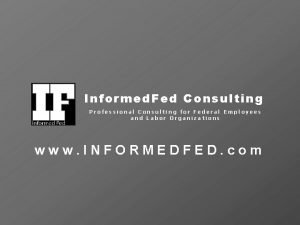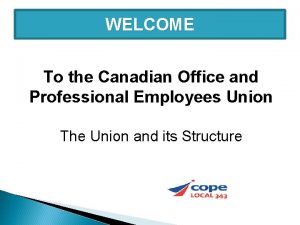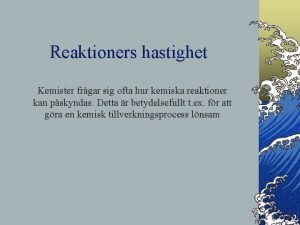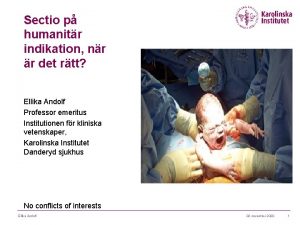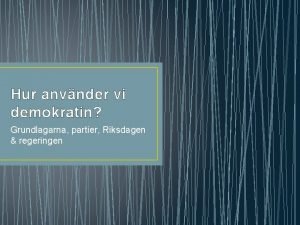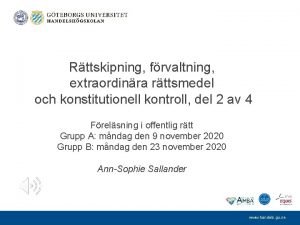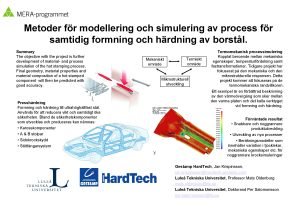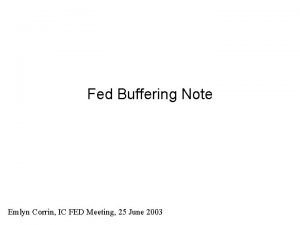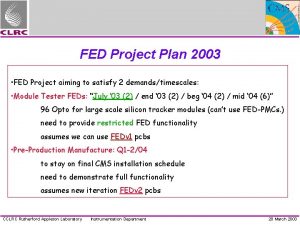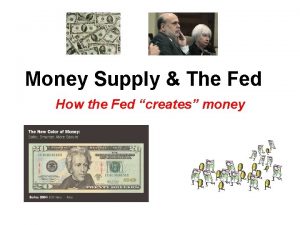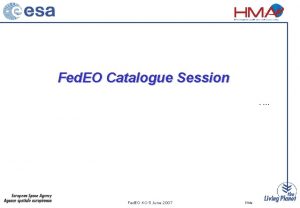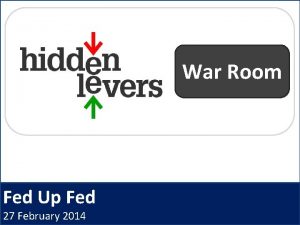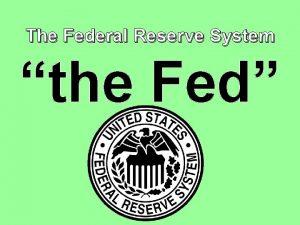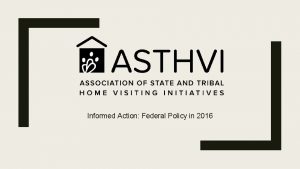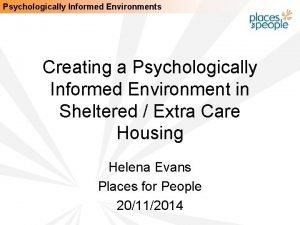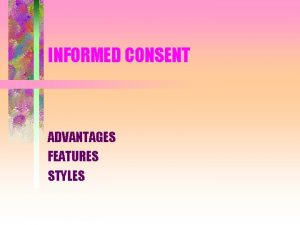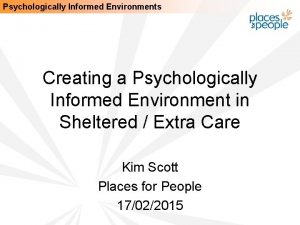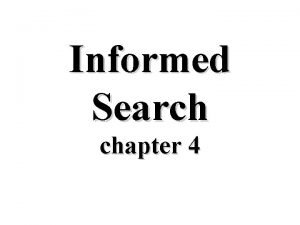Informed Fed Consulting Professional Consulting for Federal Employees






























- Slides: 30

Informed. Fed Consulting Professional Consulting for Federal Employees and Labor Organizations www. INFORMEDFED. com

Whistleblower Rights, Protections, & Prohibited Personnel Practices The Basics www. INFORMEDFED. com Professional Consulting for Federal Employees and Labor Organizations

Merit Systems Principles www. INFORMEDFED. com Professional Consulting for Federal Employees and Labor Organizations 3

Merit System Principles • Merit System Principles are the corporate values that guide the Federal Human Capital Management System and provide the foundational underpinnings directing how we manage and lead our employees. • These nine Merit System Principles provide guidance on how managers and supervisors should manage our workforce, how human resources staff should provide advisory and consulting services, and what should be at the core of every human resources decision. • Merit System Principles are part of the Civil Service Reform Act of 1978, and can be found at 5 U. S. C. § 2301(b). www. INFORMEDFED. com Professional Consulting for Federal Employees and Labor Organizations 4

Merit System Principles • Recruit, select, and advance on merit after fair and open competition. • Treat employees and applicants fairly and equitably. • Provide equal pay for equal work and reward excellent performance. • Maintain high standards of integrity, conduct, and concern for the public interest. • Manage employees efficiently and effectively. • Retain or separate employees on the basis of their performance. • Educate and train employees when it will result in better organizational or individual performance. • Protect employees from improper political influence. • Protect employees against reprisal for the lawful disclosure of information in "whistleblower" situations. www. INFORMEDFED. com Professional Consulting for Federal Employees and Labor Organizations 5

Prohibited Personnel Practices www. INFORMEDFED. com Professional Consulting for Federal Employees and Labor Organizations 6

Prohibited Personnel Practices (PPP) are actions that a Federal employee with personnel action authority MAY NOT TAKE. A Federal employee has personnel action authority if they can: take; direct others to take; recommend; or approve any personnel action. People with personnel action authority – managers and supervisors – are charged with avoiding Prohibited Personnel Practices. Committing a PPP is cause for disciplinary action (e. g. , suspension, demotion, removal, debarment from Federal employment). Managers and supervisors must take corrective action and provide relief (e. g. , restoring the employee back to his or her position) to employees who are victims of PPPs. Thirteen Prohibited Personnel Practices (PPP) are defined by law at 5 U. S. C. § 2302(b). www. INFORMEDFED. com Professional Consulting for Federal Employees and Labor Organizations 7

Prohibited Personnel Practices (PPP) 1. Discriminate for or against any employee/applicant. 2. Solicit or consider improper employment recommendations. 3. Coerce an employee's political activity. 4. Deceive or willfully obstruct a person's right to compete for employment. 5. Influence any person to withdraw from competition for a position. 6. Give unauthorized preference or improper advantage. 7. Employ, promote, or provide an employment benefit to a relative. 8. Retaliate against a whistleblower, whether an employee or applicant. 9. Retaliate against employees or applicants for exercising their lawful rights. 10. Unlawfully discriminate for conduct unrelated to work performance. 11. Knowingly violate Veterans' preference requirements. 12. Violate any law, rule, or regulation which implements or directly concerns the merit principles. 13. Implement or enforce a nondisclosure agreement or policy lacking notification of whistleblower rights. www. INFORMEDFED. com Professional Consulting for Federal Employees and Labor Organizations 8

PPP 1 - Discrimination A Federal employee authorized to take, direct others to take, recommend, or approve any personnel action may not: discriminate for or against an employee or applicant based on race, color, religion, sex (including pregnancy and gender identity), national origin, age, handicapping condition, genetic information, marital status, or political affiliation. EXAMPLE: Janet is married to Louis. One evening, Louis comes by to pick up Janet from work. Joe, Janet’s supervisor, meets Louis in the parking lot and finds that Louis is loud and obnoxious. Joe, concerned with Janet’s judgment in her choice of partner, reassigns Janet to a different position at the same pay. Joe has committed a PPP. www. INFORMEDFED. com Professional Consulting for Federal Employees and Labor Organizations 9

PPP 2 - Improper employment recommendations A Federal employee authorized to take, direct others to take, recommend, or approve any personnel action may not: solicit or consider employment recommendations based on factors other than personal knowledge or records of job-related abilities or characteristics. EXAMPLE: The Selecting Official hires Claudio based on Senator Smith’s recommendation. Senator Smith provides Claudio a recommendation based only on the fact that Claudio is a constituent of Senator Smith. The selecting official has committed a PPP. www. INFORMEDFED. com Professional Consulting for Federal Employees and Labor Organizations 10

PPP 3 - Coerce political activity A Federal employee authorized to take, direct others to take, recommend, or approve any personnel action may not: coerce the political activity of any person. EXAMPLE: The Shift Supervisor takes away significant job duties and responsibilities from Marley because Marley will not make a contribution to the Shift Supervisor’s favorite candidate. The Shift Supervisor has committed a PPP. www. INFORMEDFED. com Professional Consulting for Federal Employees and Labor Organizations 11

PPP 4 - Obstruct competition for employment A Federal employee authorized to take, direct others to take, recommend, or approve any personnel action may not: deceive or willfully obstruct anyone from competing for employment EXAMPLE: Ariel, a Supervisor located at the Network Support Office, directs that no vacancy announcements be released to the Network Budget Office where Alex works because Ariel does not want Alex to get a new job. Ariel has committed a PPP. www. INFORMEDFED. com Professional Consulting for Federal Employees and Labor Organizations 12

PPP 5 - Influence withdrawal from competition A Federal employee authorized to take, direct others to take, recommend, or approve any personnel action may not: influence anyone to withdraw from competition for any position so as to improve or injure the employment prospects of any other person. EXAMPLE: John is hiring a management analyst for a position that does not require travel. Scott applies for the position and is interviewed. John knows Scott does not like to travel. Even though the position does not require travel, John tells Scott in the interview that he would be traveling 80% of the time if he is selected for this position. Scott is unhappy with the travel but does not withdraw from the competition. John has committed a PPP. www. INFORMEDFED. com Professional Consulting for Federal Employees and Labor Organizations 13

PPP 6 - Unauthorized preference or advantage A Federal employee authorized to take, direct others to take, recommend, or approve any personnel action may not: give an unauthorized preference or advantage to anyone so as to improve or injure the employment prospects of any particular employee or applicant. EXAMPLE: Olivia wants to select her friend Ralph for a program analyst position in her office located in Miami. Olivia is worried that too many qualified candidates will apply for the position in Miami, which may prevent her selection of Ralph. Consequently, Olivia announces the vacancy in Tampa. Ralph, who lives in Miami, applies and is selected for the position in Tampa. As soon as Ralph is selected, the position is reassigned to Miami. Olivia committed a PPP. www. INFORMEDFED. com Professional Consulting for Federal Employees and Labor Organizations 14

PPP 7 - Nepotism A Federal employee authorized to take, direct others to take, recommend, or approve any personnel action may not: engage in nepotism (i. e. , hire, promote, provide an employment benefit, or advocate for the hiring, promotion, or provision of employment benefits to relatives). EXAMPLE: Operations Supervisor asks a subordinate Supervisor overseeing the evening shift to hire his stepson. The Operations Supervisor has committed a PPP. www. INFORMEDFED. com Professional Consulting for Federal Employees and Labor Organizations 15

PPP 8 – Retaliate against a whistleblower A Federal employee authorized to take, direct others to take, recommend, or approve any personnel action may not: (a) take; (b) fail to take; (c) threaten to take; or (d) threaten to fail to take a personnel action against an employee or applicant for disclosing information which the employee or applicant reasonably believes evidences: (a) (b) (c) (d) (e) (f) a violation of any law, rule or regulation; gross mismanagement; a gross waste of funds; an abuse of authority; a substantial and specific danger to public health or safety; or censorship related to scientific research, analysis, or technical information. More information about whistleblower retaliation can be found later in this training. EXAMPLE: The Director informs her staff she will reassign any employee for reporting problems at the worksiteto the local Senator. The Director has committed a PPP. www. INFORMEDFED. com Professional Consulting for Federal Employees and Labor Organizations 16

PPP 9 - Retaliation for exercising lawful rights A Federal employee authorized to take, direct others to take, recommend, or approve any personnel action may not: (a) take; (b) fail to take; (c) threaten to take; or (d) threaten to fail to take a personnel action against an employee or applicant for: (a) (b) (c) (d) exercising an appeal, complaint, or grievance right of the employee, regardless of whether such an appeal, complaint or grievance right pertains to whistleblower retaliation; testifying for or assisting another in exercising such a right; cooperating with or disclosing information to the Inspector General or the Special Counsel; or refusing to obey an order that woud require the individual to violate a law. www. INFORMEDFED. com Professional Consulting for Federal Employees and Labor Organizations 17

PPP 10 – Discrimination for conduct unrelated to work performance A Federal employee authorized to take, direct others to take, recommend, or approve any personnel action may not: discriminate on the basis of conduct unrelated to work performance. EXAMPLE: The Associate Director refuses to promote Stevie because Stevie is a outspoken member of the Tea Party and attends Tea Party events on the weekends. The Associate Director has committed a PPP. www. INFORMEDFED. com Professional Consulting for Federal Employees and Labor Organizations 18

PPP 11 – Knowingly violate veterans’ preference requirements A Federal employee authorized to take, direct others to take, recommend, or approve any personnel action may not: (a) knowingly take or fail to take; (b) recommend; or (c) approve a personnel action if the taking or failure to take such action would violate a veterans’ preference requirement. EXAMPLE: The IT Supervisor learns the candidate she wants to hire is being blocked by several candidates ranked high on the certificate because of veterans’ preference. The IT Supervisor cancels the vacancy announcement to avoid selecting candidates with veterans’ preference. The OI&T Supervisor committed a PPP. www. INFORMEDFED. com Professional Consulting for Federal Employees and Labor Organizations 19

PPP 12 - Violate any Law, Rule, or Regulation A Federal employee authorized to take, direct others to take, recommend, or approve any personnel action may not: take or fail to take a personnel action, if taking or failing to take action would violate any law, rule or regulation implementing or directly concerning merit system principles at 5 U. S. C. § 2301. EXAMPLE: Dr. Smith, a prominent DOD physician, writes a letter to the editor of a local newspaper criticizing the affirmative action plan at the DOD medical center and its impact on patient care. Dr. Smith does not sign the letter using her job title and indicates in the letter her views represent her personal opinion. Johnson, the DOD Medical Center Director, terminates Dr. Smith’s appointment because he believes Dr. Smith’s letter is unfairly critical of the medical center. Johnson committed a PPP because he took a personnel action (termination) in violation of a law (first amendment right to free speech on a matter of public concern) that implements a merit system principle (treat employees and applicants fairly and equitably). www. INFORMEDFED. com Professional Consulting for Federal Employees and Labor Organizations 20

PPP 13 – Nondisclosure agreements without certain language A Federal employee authorized to take, direct others to take, recommend, or approve any personnel action may not: implement or enforce any nondisclosure policy, form, or agreement, if such policy, form, or agreement does not contain the following statement: "These provisions are consistent with and do not supersede, conflict with, or otherwise alter the employee obligations, rights, or liabilities created by existing statute or Executive order relating to (1) classified information, (2) communications to Congress, (3) the reporting to an Inspector General of a violation of any law, rule, or regulation, or mismanagement, a gross waste of funds, an abuse of authority, or a substantial and specific danger to public health or safety, or (4) any other whistleblower protection. The definitions, requirements, obligations, rights, sanctions, and liabilities created by controlling Executive orders and statutory provisions are incorporated into this agreement and are controlling. ” www. INFORMEDFED. com Professional Consulting for Federal Employees and Labor Organizations 21

Whistleblower Retaliation and Protected Disclosures www. INFORMEDFED. com Professional Consulting for Federal Employees and Labor Organizations 22

Whistleblower retaliation and protected disclosures Whistleblower disclosures are crucial in helping to expose fraud, waste, abuse, mismanagement, and threats or harm to public health and safety across the Federal government. Whistleblowers disclosures save billions of dollars and even human lives. Retaliating against a whistleblower is a Prohibited Personnel Practice (PPP). Whistleblower retaliation is cause for disciplinary action (e. g. , suspension, demotion, removal, debarment from Federal employment). Victims of whistleblower retaliation are also entitled to corrective action and relief (e. g. , restoring the employee back to his or her position). www. INFORMEDFED. com Professional Consulting for Federal Employees and Labor Organizations 23

Protected disclosures are defined as disclosing information which the whistleblower reasonably believes evidences: a violation of law, rule, or regulation; gross mismanagement; gross waste of funds; an abuse of authority; a substantial and specific danger to public health or safety; or Censorship related to scientific research, analysis or technical information. Determining what is a protected disclosure: The information disclosed does not have to be accurate to be protected. No requirement that a whistleblower go through his or her chain of command. Whistleblower’s personal motivation does not negate reasonable belief. Employee or applicant is protected if an employer mistakenly believes the employee or applicant is a whistleblower. 24

Whistleblower retaliation Whistleblower Retaliation: A Federal employee authorized to take, direct others to take, recommend or approve any personnel action MAY NOT take, fail to take, or threaten to take any personnel action against an employee because of a protected disclosure. EXAMPLE: A supervisor directs the geographic reassignment of an employee because the employee reported safety violations to senior agency officials. Personnel actions that may constitute retaliation include (but are not limited to) reassignment, suspension, termination, adverse pay decisions, or a change in duties, responsibilities or working conditions, such as suspending an employee’s ability to telework. www. INFORMEDFED. com Professional Consulting for Federal Employees and Labor Organizations 25

Whistleblower retaliation complaints Elements of a whistleblower retaliation complaint: An employee filing a whistleblower retaliation complaint must show that: he or she engaged in an activity that he or she reasonably believed to be a protected disclosure; the employer knew about the protected disclosure and the identity of the employee making the disclosure; the employer took, failed to take (e. g. , such as in the case of a promotion), threatened to take, or influenced an official to take a personnel action against the employee; and the protected disclosure was a contributing factor in the personnel action. If all these elements are met, the agency then would have to show by clear and convincing evidence that it would have taken the same action without the disclosure. Clear and convincing evidence factors include the: strength of the evidence in support of the personnel action; existence and strength of a motive to retaliate; and Treatment of similar employees who are not whistleblowers. www. INFORMEDFED. com Professional Consulting for Federal Employees and Labor Organizations 26

Enforcement Entities www. INFORMEDFED. com Professional Consulting for Federal Employees and Labor Organizations 27

U. S. Office of Special Counsel (OSC) • • • U. S. Merit Systems Protection Board (MSPB) • • • Independent agency enforcing whistleblower protections, safeguarding the merit system, and providing a secure channel for whistleblower disclosures. OSC may accept whistleblower disclosures and require an agency to investigate the disclosures. OSC may accept and investigate Prohibited Personnel Practices (PPP), especially whistleblower retaliation complaints. OSC may recommend corrective action (e. g. , placing an employee back in his or her position) for a whistleblower. OSC may recommend disciplinary action against employees who commit PPP, including whistleblower retaliation. If the agency refuses to comply with OSC’s recommendation for corrective or disciplinary action, OSC may file a complaint with the Merit Systems Protection Board (MSPB). Web: www. osc. gov Independent agency protecting merit system principles and promoting an effective Federal workforce free of Prohibited Personnel Practices (PPP). Hears and decides appeals of disciplinary and performance-based actions filed by employees appointed under title 5 of the United States Code, including employees in the Senior Executive Service. May hear and decide appeals in certain other instances for employees appointed under title 38 of the United States Code. Hears and decides actions filed by the U. S. Office of Special Counsel (OSC). Can require an agency to take corrective action for a whistleblower or disciplinary action against an employee who has committed a PPP, including whistleblower retaliation. Web: www. mspb. gov www. INFORMEDFED. com Professional Consulting for Federal Employees and Labor Organizations Prohibited Personnel Practices: 800 -872 -9855 Disclosures: 800 -572 -2249 28

U. S. Equal Employment Opportunity Commission (EEOC) • • • Independent agency responsible for enforcing Federal laws that make it illegal to discriminate against a job applicant or an employee because of the person's race, color, religion, sex (including pregnancy and gender identity), national origin, age (40 or older), disability or genetic information. Hears and decides discrimination complaints, including workplace hostility (hostile work environment) complaints due to one of the classes described above. Hears and decides complaints on reasonable workplace accommodations. Hears and decides complaints alleging retaliation for filing a discrimination complaint or participating in an employment discrimination investigation or lawsuit. Can require an agency to take corrective action. www. INFORMEDFED. com Professional Consulting for Federal Employees and Labor Organizations Web: www. eeoc. gov 29

Informed. Fed Consulting Professional Consulting for Federal Employees and Labor Organizations www. INFORMEDFED. com
 Fed consulting
Fed consulting Canadian office and professional employees union
Canadian office and professional employees union Cmi level 8 doctorate
Cmi level 8 doctorate Vad är ett minoritetsspråk
Vad är ett minoritetsspråk Novell typiska drag
Novell typiska drag Frgar
Frgar Magnetsjukhus
Magnetsjukhus Indikation för kejsarsnitt på moderns önskan
Indikation för kejsarsnitt på moderns önskan Steg för steg rita
Steg för steg rita Toppslätskivling dos
Toppslätskivling dos Redogör för vad psykologi är
Redogör för vad psykologi är En lathund för arbete med kontinuitetshantering
En lathund för arbete med kontinuitetshantering Bra mat för unga idrottare
Bra mat för unga idrottare Ramsa geometriska former
Ramsa geometriska former Bästa kameran för astrofoto
Bästa kameran för astrofoto Dikt bunden form
Dikt bunden form Etik och ledarskap etisk kod för chefer
Etik och ledarskap etisk kod för chefer Svenskt ramverk för digital samverkan
Svenskt ramverk för digital samverkan Kvinnlig mantel i antikens rom
Kvinnlig mantel i antikens rom Orubbliga rättigheter
Orubbliga rättigheter Förklara densitet för barn
Förklara densitet för barn Ministerstyre för och nackdelar
Ministerstyre för och nackdelar Jätte råtta
Jätte råtta Kanaans land
Kanaans land Nationell inriktning för artificiell intelligens
Nationell inriktning för artificiell intelligens Sju principer för tillitsbaserad styrning
Sju principer för tillitsbaserad styrning Nyckelkompetenser för livslångt lärande
Nyckelkompetenser för livslångt lärande Sju för caesar
Sju för caesar Handledning reflektionsmodellen
Handledning reflektionsmodellen Stål för stötfångarsystem
Stål för stötfångarsystem Adressändring ideell förening
Adressändring ideell förening
